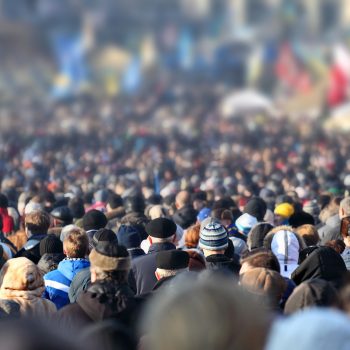 The Oregonian published an op-ed co-authored by Steve Moore and faith leaders in our community calling for understanding, tolerance, and cooperation in this challenging moment for our country. We encourage you to read the op-ed and share it.
The Oregonian published an op-ed co-authored by Steve Moore and faith leaders in our community calling for understanding, tolerance, and cooperation in this challenging moment for our country. We encourage you to read the op-ed and share it.
On December 3, 1956, a year after the Montgomery, Ala., bus boycott began, the Rev. Martin Luther King Jr. returned to the building where the boycott had been organized — the Holt Street Baptist Church.
King delivered a speech titled “Facing the Challenge of a New Age,” an age he described as “momentous,” “exciting” and “filled with hope.” Though seen through other eyes, he admitted, the view was vastly different: “… there are those who would contend that we live in the most ghastly period of human history.”
A lot has changed in six decades, and plenty hasn’t. Democracy is as messy and challenging as ever; the temptation to chase chaos and fear into the shadows remains strong. But anger alone won’t move us forward any more than the object of that anger will. Both slash at the fabric holding us together.
As a nation, our communities are stronger and more vibrant when we embrace and honor a robust pluralism. It’s not about conservative or liberal, moderate or independent; it’s not whether you worship at a church, mosque, synagogue, temple, shrine or none of the above.
It’s about justice, compassion, respect, understanding and, perhaps most importantly, the willingness to work toward greater understanding. To pause. To breathe. To listen. To learn. To engage and volunteer. To be inspired by the spirit of togetherness rather than torn apart by the specter of our differences. To see an opportunity where others might see only uncertainty.
Consider Texas, where a mosque burned to the ground and leaders of all faiths offered space for worship, including Jewish leaders who handed over the keys to their synagogue. Or here in Tigard, where the Muslim Educational Trust called an emergency forum earlier this month and more than 1,000 everyday citizens and community leaders turned out to voice support for the rights of immigrants and refugees and their importance to our history and to our future.
The five of us believe in honoring our deepest differences while still coming together in friendship and engaging in the civil dialogue that builds stronger, safer communities benefitting from the contributions of all.
Are we there yet? No. Democracy is forever a work in progress, and it forever calls on our best to proceed.
In 1956, in those still early days of the Civil Rights struggle, King didn’t call for disarray, and he didn’t yield to negativity. “In this period of transition and growing social change,” he said, “there is a dire need for leaders who are calm and yet positive.”
The moment, he said, called for leaders not in love with money or fame, “but in love with humanity.”
Though the current cultural moment is a challenging one, we believe it’s worth the effort to work together for the common good. And though our culture feels stacked with obstacles and divisiveness, now is the moment to find common ground and address some of the most pressing challenges facing all communities: homelessness, mental illness, prejudice, economic development, educational opportunity and violence.
Regardless of how you voted in our recent elections, we must reaffirm our commitment that people of all backgrounds are integral to the success of our country. It’s easy to welcome our friends. We must remember to welcome those we do not know, too.
When we choose service and understanding over violence, civil discourse over divisive rhetoric, and faith over despair, we extend the spirit of hospitality and strengthen the fabric of friendship and community — the fabric of our nation.
Allen Bethel is president of the Albina Ministerial Alliance and senior pastor at Maranatha Church; Jan Elfers is executive director of Ecumenical Ministries of Oregon; Wajdi Said is the president and co-founder of the Muslim Educational Trust; Alexander K. Sample is Archbishop of the Catholic Archdiocese of Portland in Oregon; Steve Moore is executive director of the M.J. Murdock Charitable Trust, a private foundation partnering with organizations that seek to enrich life in the Pacific Northwest.
King delivered a speech titled “Facing the Challenge of a New Age,” an age he described as “momentous,” “exciting” and “filled with hope.” Though seen through other eyes, he admitted, the view was vastly different: “… there are those who would contend that we live in the most ghastly period of human history.”
A lot has changed in six decades, and plenty hasn’t. Democracy is as messy and challenging as ever; the temptation to chase chaos and fear into the shadows remains strong. But anger alone won’t move us forward any more than the object of that anger will. Both slash at the fabric holding us together.
As a nation, our communities are stronger and more vibrant when we embrace and honor a robust pluralism. It’s not about conservative or liberal, moderate or independent; it’s not whether you worship at a church, mosque, synagogue, temple, shrine or none of the above.
It’s about justice, compassion, respect, understanding and, perhaps most importantly, the willingness to work toward greater understanding. To pause. To breathe. To listen. To learn. To engage and volunteer. To be inspired by the spirit of togetherness rather than torn apart by the specter of our differences. To see an opportunity where others might see only uncertainty.
Consider Texas, where a mosque burned to the ground and leaders of all faiths offered space for worship, including Jewish leaders who handed over the keys to their synagogue. Or here in Tigard, where the Muslim Educational Trust called an emergency forum earlier this month and more than 1,000 everyday citizens and community leaders turned out to voice support for the rights of immigrants and refugees and their importance to our history and to our future.
The five of us believe in honoring our deepest differences while still coming together in friendship and engaging in the civil dialogue that builds stronger, safer communities benefitting from the contributions of all.
Are we there yet? No. Democracy is forever a work in progress, and it forever calls on our best to proceed.
In 1956, in those still early days of the Civil Rights struggle, King didn’t call for disarray, and he didn’t yield to negativity. “In this period of transition and growing social change,” he said, “there is a dire need for leaders who are calm and yet positive.”
The moment, he said, called for leaders not in love with money or fame, “but in love with humanity.”
Though the current cultural moment is a challenging one, we believe it’s worth the effort to work together for the common good. And though our culture feels stacked with obstacles and divisiveness, now is the moment to find common ground and address some of the most pressing challenges facing all communities: homelessness, mental illness, prejudice, economic development, educational opportunity and violence.
Regardless of how you voted in our recent elections, we must reaffirm our commitment that people of all backgrounds are integral to the success of our country. It’s easy to welcome our friends. We must remember to welcome those we do not know, too.
When we choose service and understanding over violence, civil discourse over divisive rhetoric, and faith over despair, we extend the spirit of hospitality and strengthen the fabric of friendship and community — the fabric of our nation.
Allen Bethel is president of the Albina Ministerial Alliance and senior pastor at Maranatha Church; Jan Elfers is executive director of Ecumenical Ministries of Oregon; Wajdi Said is the president and co-founder of the Muslim Educational Trust; Alexander K. Sample is Archbishop of the Catholic Archdiocese of Portland in Oregon; Steve Moore is executive director of the M.J. Murdock Charitable Trust, a private foundation partnering with organizations that seek to enrich life in the Pacific Northwest.







